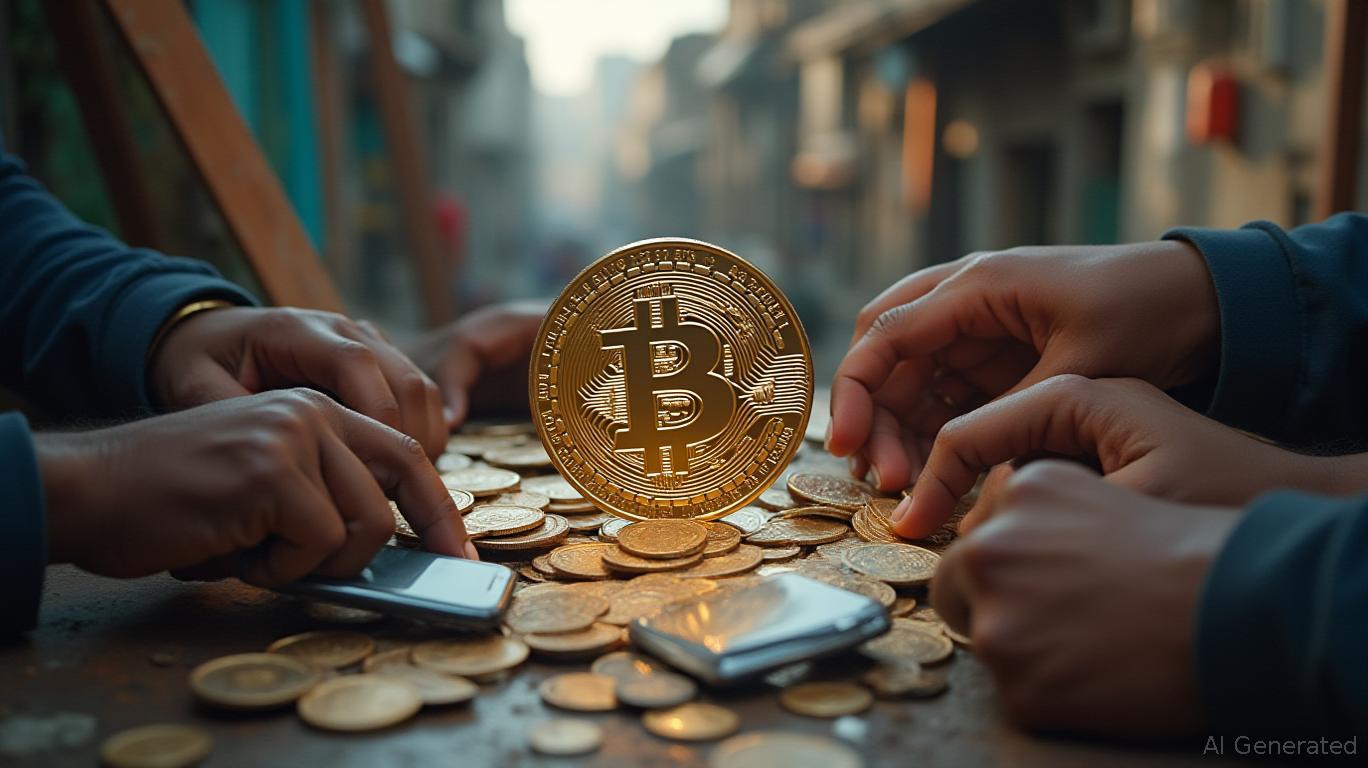Blockchain-based banking offers a crucial solution to Venezuela's hyperinflation crisis
- Venezuela's Conexus plans to integrate Bitcoin and stablecoins into its banking network via a blockchain-based interbank system, enabling custody, transfers, and fiat exchanges. - The initiative addresses hyperinflation and currency instability, leveraging crypto as an inflation hedge while offering low-cost cross-border payments for 40% of the country's electronic transactions. - Modeled after successful mobile payment systems, the project mirrors global trends like JPMorgan's crypto custody and SWIFT's
Venezuela is preparing to overhaul its financial sector as Conexus, the country’s top payment processor, plans to incorporate
The motivation behind this integration stems from Venezuela’s ongoing economic difficulties, such as hyperinflation and a volatile currency. Gasparri pointed out that more Venezuelans are turning to stablecoins and Bitcoin to shield themselves from inflation, a pattern that has accelerated in recent years. By adopting blockchain, Conexus intends to deliver a transparent and secure environment for cryptocurrency transactions, enabling users to safeguard their wealth while enjoying quick and affordable international payments, according to

The planned platform will build on the achievements of interbank mobile payments, which are now a vital part of Venezuela’s financial system. Conexus, the pioneer of the nation’s mobile payments—handling 100 million transactions each month—views blockchain as the natural next phase in digital finance. Gasparri likened the project to BBVA’s crypto custody services in Spain, suggesting that regulated blockchain use could broaden access to digital assets while preserving institutional protections, as reported by
On a global scale, this initiative fits with wider trends in financial technology. Leading U.S. banks, including JPMorgan and Bank of America, have already introduced crypto custody solutions, and SWIFT has announced intentions to shift stablecoin transactions onto blockchain platforms. At the same time, regulators are addressing the challenges posed by the swift rise of stablecoins. A regulatory framework from 2022, scheduled for implementation in 2026, will require banks dealing with crypto assets to meet strict capital standards, prompting a reassessment to better match regulatory measures with the changing market. The U.S. has also moved forward, passing the GENIUS Act in 2025 to encourage crypto adoption, as noted by Invezz.
Conexus aims to roll out its project in December 2025, with the necessary infrastructure already being developed, Coinpedia added. If the initiative succeeds, Venezuela could emerge as a leader in blockchain-driven finance in the region, providing a model for other nations seeking to address economic instability through digital solutions.
Disclaimer: The content of this article solely reflects the author's opinion and does not represent the platform in any capacity. This article is not intended to serve as a reference for making investment decisions.
You may also like
Solana News Today: Blockchain Joins Forces with Wall Street: Circle's Arc Testnet Transforms the Financial Sector
- Circle's Arc blockchain testnet, involving BlackRock, Visa, and Deutsche Bank, aims to integrate blockchain into traditional finance with sub-second transactions and predictable fees. - Circle partners with ClearBank to expand MiCA-compliant USDC/EURC in Europe, enabling 90% cheaper cross-border transactions via instant, low-cost payments. - Circle mints $7.5B USDC on Solana, boosting TVL to $10B, positioning the network to compete with Ethereum in institutional DeFi due to high throughput. - USDC's 72%

KapKap's $10 Million Gamble: Turning Focus and Innovation into Profit in the Emerging Web3 Economy
- Web3 platform KapKap raised $10M in seed funding led by Animoca Brands to develop its Key Attention Pricing System (KAPS), converting user engagement into tradable digital assets. - KAPS quantifies creativity and participation via a "K-score" metric, creating a transparent economy where attention and contributions directly generate value for stakeholders. - The platform partners with BAYC and ApeCoin DAO, targeting 1.7M monthly users through casual games that blend blockchain utility with mainstream acce

Ethereum Updates Today: MoonBull's Ambitious 9,256% Return—Will Limited Supply Surpass Ethereum's Surge?
- MoonBull ($MOBU) emerges as a high-risk crypto contender with 9,256% ROI projections via its 23-stage presale model and 95% APY staking rewards. - Ethereum (ETH) nears $4,200 amid Fed rate cut speculation, with analysts forecasting $6,000 as upgrades and macroeconomic stability drive institutional interest. - Solana (SOL) gains traction with a $3B–$6B ETF inflow forecast, mirroring Bitcoin's institutional adoption trajectory and capturing 22% of Ethereum's market cap. - All three projects face volatility
90% Gone, 100% Demand — Milk Mocha’s $HUGS Whitelist Turns Heads Across Crypto
